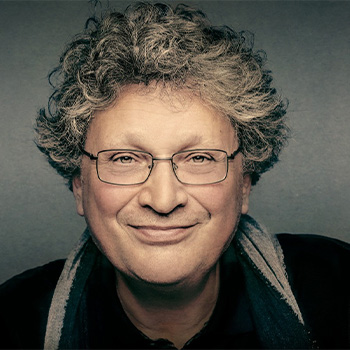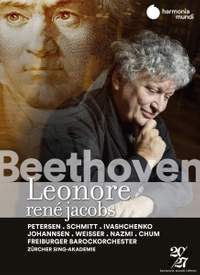Recording of the Week,
Beethoven's Leonore from René Jacobs and the Freiburger Barockorchester
Amid the plethora of recordings anticipating the 250th anniversary of his birth next year, I was starting to feel in danger of Beethoven fatigue before 2020 had even arrived until René Jacobs’s enthralling, idiosyncratic account of the composer’s only opera in its original 1805 version grabbed me by the scruff of the neck last weekend. Following an inauspicious premiere dogged by overtaxed singers and an audience dominated by French military officers, Beethoven revised and streamlined the score twice before it opened as Fidelio in 1814, but Jacobs gives us the raw material in all its wonderful and slightly weird glory.
 Not only are recordings of this version few and far between, but period-instrument accounts of the opera in any of its incarnations are surprisingly rare – I remember trying to track one down without success after hearing Simon Rattle conduct a revelatory performance with the Orchestra of the Age of Enlightenment at the 2001 Proms, and since then most new recordings (including Rattle’s own, with the Berliner Philharmoniker) have employed big bands and big, often Wagnerian voices. What a joy, then, to hear the rasping natural horns and dry timpani of the Freiburger Barockorchester conjuring Florestan’s dungeon into eerie life and lighter-voiced Classical specialists (several of them alumni of Jacobs’s Mozart opera series) taking the more florid vocal writing of this original draft entirely in their strides. Leonore’s music is even more murderously demanding here than in Fidelio and Marlis Petersen, who will sing Fidelio for Kirill Petrenko in Baden-Baden next year, tackles the additional volleys of triplets and exposed high Cs with aplomb; the fine Bach and Mozart tenor Maximilian Schmitt, however, is spared the more strenuous tortures which Beethoven would later devise for the imprisoned Florestan.
Not only are recordings of this version few and far between, but period-instrument accounts of the opera in any of its incarnations are surprisingly rare – I remember trying to track one down without success after hearing Simon Rattle conduct a revelatory performance with the Orchestra of the Age of Enlightenment at the 2001 Proms, and since then most new recordings (including Rattle’s own, with the Berliner Philharmoniker) have employed big bands and big, often Wagnerian voices. What a joy, then, to hear the rasping natural horns and dry timpani of the Freiburger Barockorchester conjuring Florestan’s dungeon into eerie life and lighter-voiced Classical specialists (several of them alumni of Jacobs’s Mozart opera series) taking the more florid vocal writing of this original draft entirely in their strides. Leonore’s music is even more murderously demanding here than in Fidelio and Marlis Petersen, who will sing Fidelio for Kirill Petrenko in Baden-Baden next year, tackles the additional volleys of triplets and exposed high Cs with aplomb; the fine Bach and Mozart tenor Maximilian Schmitt, however, is spared the more strenuous tortures which Beethoven would later devise for the imprisoned Florestan.
 This three-act version is less concise than its successor but is never in danger of dragging here: Jacobs hurtles through the score at breakneck speed so that the adrenaline-level never drops and the action unfolds like a pacey thriller. For the most part it works brilliantly in service of the drama and characterisation – the breathless eroticism of Marzelline’s day-dreams about ‘Fidelio’ as she tackles the ironing comes across loud and clear, and high-stakes moments like the great confrontation between Pizarro and Leonore in the dungeon have a real edge-of-the-seat quality. Occasionally I did long for just a little breathing-space, notably in the Prisoners’ Chorus (which sounds rather like the inmates are enjoying a brisk jog around the exercise-yard) and the glorious ‘last supper’ trio in which Leonore and Rocco share bread and wine with the starving Florestan. The one moment when Jacobs does step off the gas, though, is all the more special because of its unexpectedness: Florestan and Leonore’s rapturous duet ‘O namenlose Freude!’ (often interpreted as a near-hysterical outpouring of relief) is taken at an unusually steady tempo, and their reunion’s all the more tender and profound for it. The preceding passage, which Beethoven cut from the final version, is one of the few points where the dramatic momentum of the score does flag a little, but somehow Jacobs’s decision to dial down the tension here rather than motoring on through mitigates this rather than underlining it.
This three-act version is less concise than its successor but is never in danger of dragging here: Jacobs hurtles through the score at breakneck speed so that the adrenaline-level never drops and the action unfolds like a pacey thriller. For the most part it works brilliantly in service of the drama and characterisation – the breathless eroticism of Marzelline’s day-dreams about ‘Fidelio’ as she tackles the ironing comes across loud and clear, and high-stakes moments like the great confrontation between Pizarro and Leonore in the dungeon have a real edge-of-the-seat quality. Occasionally I did long for just a little breathing-space, notably in the Prisoners’ Chorus (which sounds rather like the inmates are enjoying a brisk jog around the exercise-yard) and the glorious ‘last supper’ trio in which Leonore and Rocco share bread and wine with the starving Florestan. The one moment when Jacobs does step off the gas, though, is all the more special because of its unexpectedness: Florestan and Leonore’s rapturous duet ‘O namenlose Freude!’ (often interpreted as a near-hysterical outpouring of relief) is taken at an unusually steady tempo, and their reunion’s all the more tender and profound for it. The preceding passage, which Beethoven cut from the final version, is one of the few points where the dramatic momentum of the score does flag a little, but somehow Jacobs’s decision to dial down the tension here rather than motoring on through mitigates this rather than underlining it.
Elsewhere, though, it seems a pity that so much was consigned to the cutting-room floor by 1814 – take the wonderful Act Two duet with obbligato violin for Marzelline and Leonore, fleshing out a relationship which gets relatively short shrift in the final version. And I mean no backhanded compliment when I say that hearing Beethoven’s original thoughts often throws the strangeness and genius of the revised score into even starker relief: Florestan’s opening monologue, for instance, is a little acorn here rather than the great oak which it would become in 1814, and the relatively four-square final chorus has a homely, very human charm all of its own in comparison with the monumental grandeur of its later incarnation. (Dramatic loose ends are all neatly tied up in 1805, with Marzelline pragmatically rebounding onto Jaquino, and Pizarro’s fate signed over to the King).
Prepare yourself for a white-knuckle ride, then, but this is a must-have for anyone who’s interested in the genesis of Beethoven’s masterpiece, and a thrilling sequel to Jacobs’s superb Mozart series from the 2000s.
Marlis Petersen (Leonore), Maximilian Schmitt (Florestan), Dimitry Ivashchenko (Rocco), Johannes Weisser (Pizarro), Robin Johannsen (Marzelline), Johannes Chum (Jaquino), Tareq Nazmi (Don Fernando), Florian Feth, Julian Popken (Two Prisoners)
Freiburger Barockorchester, René Jacobs
Available Formats: MP3, FLAC, Hi-Res FLAC



